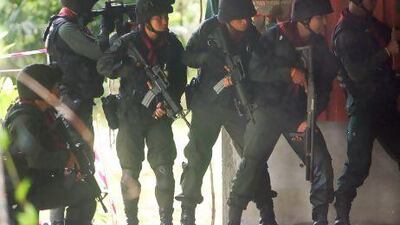PATTANI, THAILAND // Experts have warned of reprisal attacks after Thai marines killed 16 militants who attacked their base, as violence deepens in the Muslim-majority districts of southern Thailand.
About 50 militants swarmed the outpost in Bacho district of Narathiwat province early yesterday morning, wearing combat uniforms and armed with assault weapons.
But a tip-off of a possible attack had already reached the base, said Colonel Pramote Promin, spokesman for the army's southern command. The 30 marines were on high alert when the assault came, and suffered no casualties.
It was the worst setback for the insurgents since more than 100 died in a single day in 2004, including 34 who were killed by police at the Kreu-Sae mosque in Pattani province.
Since it resumed in 2001, the separatist insurgency in Thailand's three southern-most provinces has claimed more than 5,000 lives. Barely a day passes without news of an attack on government workers, police, civilians or some of the 60,000 soldiers stationed here.
Annexed by Thailand (then Siam) in 1909, this region is home to Malay-Muslims, whose distinct language and culture means they have long chafed under the rule of Buddhist-dominated Thai governments. An armed independence movement first emerged in the 1960s, but the latest wave has been the most violent.
Lately, the militants have grown increasingly professional and daring. They have launched several attacks on military outposts since early 2011, always catching the military off-guard. But the failure of yesterday's attack may indicate they have over-reached.
"The insurgents were lulled into a false sense of security because their last six or seven operations have been largely successful - they thought they could keep ratcheting up the pressure," said Anthony Davies, a Bangkok-based analyst for IHS Jane's, who is an expert on the southern conflict.
"This failure will really hit them hard. I will be hugely surprised if they attempt another major operation on this kind of hard target in the next few months."
The result is likely to be increased attacks on soft targets, such as Buddhist civilians, Mr Davies said. Teachers are frequently targeted, because they are thought to represent state authority and attempts to subvert local culture through Thai-centric education programmes. Human Rights Watch says 157 have been killed since 2004.
There were hopes in the past year that the violence was waning, with militants claiming they would halt attacks on civilians.
But the assassination in November of a respected local imam, Abdullateh Todir, has triggered another round of tit-for-tat violence. It is widely believed that he was killed by a military death-squad, who felt he was too close to the militants. The insurgents have responded with a number of attacks on civilian and military targets, including a twin attack on Sunday in which roadside bombs killed five soldiers.
In recent years, successive governments have poured money into the region and opened secret dialogues with militant leaders in a bid to contain the insurgency.
But its shadowy nature makes it hard to find a solution. The leaders have never published a clear political agenda, and much of the violence is thought to be motivated by criminal motives or personal vendettas. Nor is clear who commands the fighters on the ground. A range of exiled groups claim they still have control over the movement, but many analysts believe the current crop of militants acts largely on its own.
"The exiled leaders are part of the previous generation," said Don Pathan, a local journalist who has closely studied the conflict and interviewed many insurgents. "Now the movement is too fluid for anyone to control. You get one guy who calls himself president but there are two more who say the same thing. That makes it very difficult for the government to negotiate."
Following the bombings on Sunday, the government of prime minister Yingluck Shinawatra said it was considering a long-term curfew, clamping down on all night-time movement in the south. A vote will be taken tomorrow, with legislators divided on the issue.
"The latest attack will encourage those who want to push for a curfew. After all, you had truckloads of armed men driving through the region without getting stopped," said Mr Davies. "But a curfew angers the civilians and provides effective propaganda to the insurgents. And it requires the sort of effective patrolling and local intelligence which the Thai military has not exhibited in the past."
foreign.desk@thenational.ae

